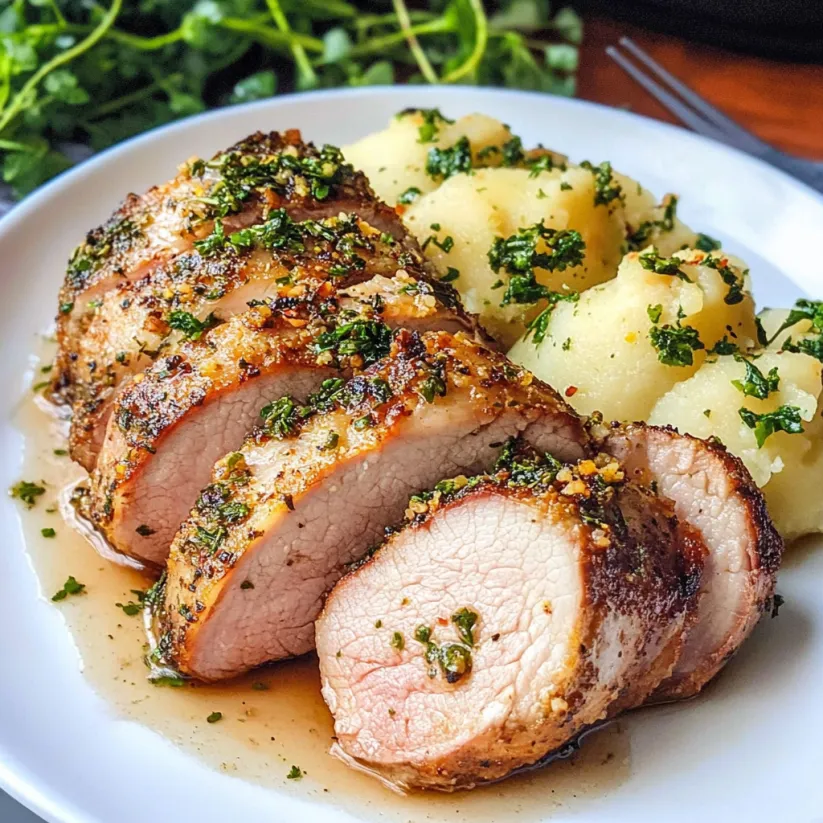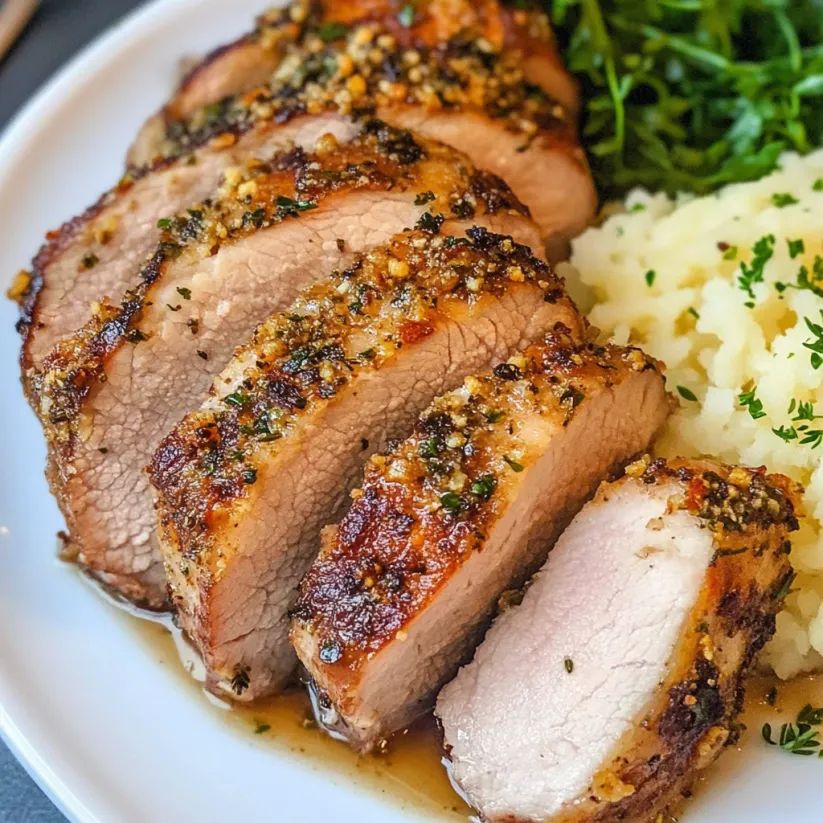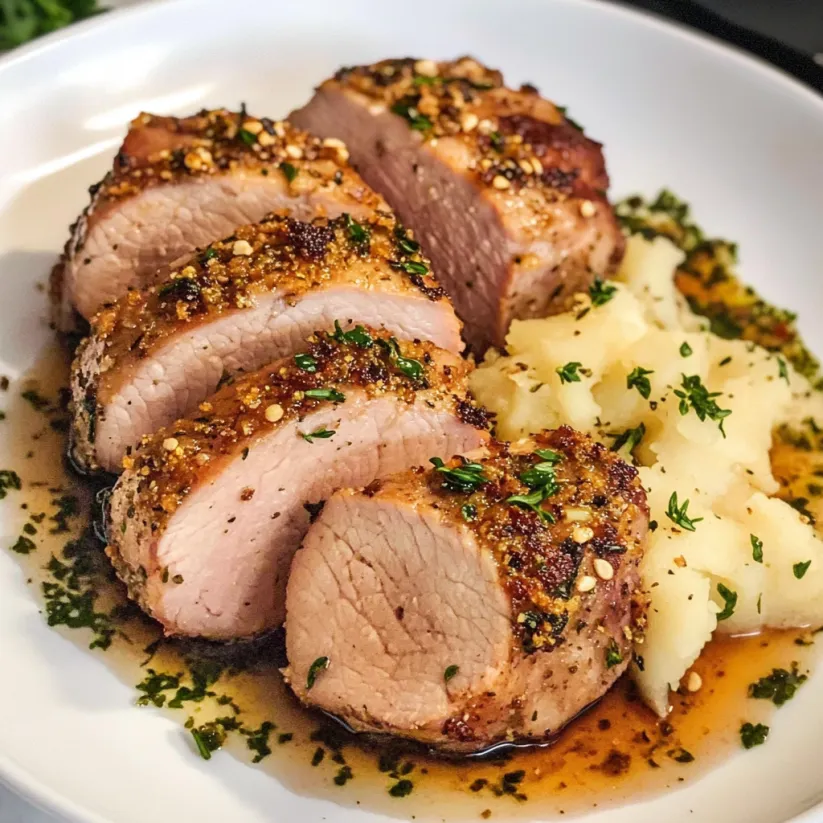 Bookmark
Bookmark
This herb crusted pork tenderloin has become my family's go-to special dinner because it delivers restaurant quality results with minimal effort. The aromatic herbs create a gorgeous crust while keeping the pork incredibly tender and juicy inside.
I first made this recipe when my in-laws visited unexpectedly and I needed something that seemed fancy but wouldn't keep me in the kitchen all night. They were so impressed they requested it for every visit afterward.
Ingredients
- Pork tenderloin: 1 to 1.5 pounds - the star of the show; select one with good marbling and a pinkish red color
- Olive oil: 2 tablespoons - creates the base for our herb paste and helps achieve that beautiful sear
- Fresh garlic: 2 cloves - provides essential aromatic flavor; look for firm heads with tight skin
- Fresh rosemary: 1 tablespoon - adds piney aromatic notes that pair perfectly with pork
- Fresh thyme: 1 tablespoon - brings a subtle earthy flavor that enhances without overwhelming
- Fresh parsley: 1 tablespoon - adds brightness and color to balance the stronger herbs
- Salt and pepper: to taste - essential for enhancing all the flavors
Step-by-Step Instructions
- Prep the pork:
- Trim any silver skin and excess fat using a sharp knife. This step is crucial as silver skin becomes tough when cooked. Pat the meat completely dry with paper towels to ensure a proper sear.
- Create the herb paste:
- Combine the minced garlic with all fresh herbs in a small bowl. Add olive oil and mix until you have a spreadable paste. This fragrant mixture is what will create your beautiful crust.
- Season the meat:
- Rub the herb mixture generously over the entire surface of the tenderloin. Press it firmly onto the meat to help it adhere. Make sure every side is coated for maximum flavor.
- Sear to perfection:
- Heat your cast iron skillet until it is very hot. Place the herb coated pork in the pan and sear each side for 2 to 3 minutes until golden brown. This creates a flavorful crust that seals in juices.
- Finish in the oven:
- Transfer the entire skillet to your preheated oven. Roast for 20 to 25 minutes or until the internal temperature reaches 145°F. The controlled heat of the oven ensures even cooking throughout.
- Rest before slicing:
- Allow the cooked tenderloin to rest for 5 to 10 minutes before cutting into it. This critical step allows juices to redistribute throughout the meat making each slice moist and tender.
 Bookmark
Bookmark
The rosemary is what makes this recipe special for me. I grow it in my garden year-round and the aroma it releases when rubbed between my fingers instantly takes me back to Sunday dinners at my grandmother's house where she always used rosemary in her roasts.
Perfect Temperature Guide
Achieving the right internal temperature is crucial for this dish. At 145°F the pork will be slightly pink in the center, perfectly safe and incredibly juicy. If you prefer it more done, 150–155°F will give you less pink but still tender meat. Anything beyond 160°F risks becoming dry.
Using a quality meat thermometer makes all the difference here. Insert it into the thickest part of the tenderloin for the most accurate reading. I learned the hard way that guessing leads to either undercooked or tough overcooked meat, neither of which impresses dinner guests.
 Bookmark
Bookmark
Serving Suggestions
This herb crusted pork tenderloin pairs beautifully with roasted root vegetables like carrots, parsnips, and potatoes. The vegetables can even roast alongside the pork in the same oven making cleanup easier.
For a complete meal, I often serve it with a simple arugula salad dressed with lemon juice and olive oil. The peppery greens and bright acidity cut through the richness of the pork creating a perfectly balanced plate.
For special occasions, try serving thin slices of the tenderloin over creamy mashed potatoes with the pan juices drizzled on top. The combination of tender pork, crispy herb crust, and creamy potatoes never fails to impress.
Make Ahead Options
This recipe works wonderfully for meal prep or entertaining. You can prepare the herb mixture and trim the pork up to 24 hours in advance keeping them separately in the refrigerator. The herb oil mixture actually improves in flavor as it sits.
You can even coat the pork with the herb mixture up to 8 hours before cooking keeping it covered in the refrigerator. This allows the flavors to penetrate the meat resulting in an even more flavorful finished dish. Just bring the pork to room temperature for 30 minutes before cooking.
Common Recipe Questions
- → How do I know when the pork tenderloin is done cooking?
The pork tenderloin is done when it reaches an internal temperature of 145°F (63°C) when measured with a meat thermometer. The meat should have a slight blush of pink in the center. Always let it rest for 5-10 minutes after cooking to allow the juices to redistribute throughout the meat.
- → Can I use dried herbs instead of fresh?
Yes, you can substitute dried herbs, but use about one-third the amount called for with fresh herbs since dried herbs are more potent. For this dish, use 1 teaspoon each of dried rosemary, thyme, and parsley instead of 1 tablespoon of each fresh herb.
- → How do I trim the silver skin from pork tenderloin?
To remove silver skin, slide a sharp knife between the silver skin and meat at one end. Angle the knife slightly upward and hold the silver skin with your other hand while you slide the knife along the tenderloin, separating the silver skin as you go. Removing this tough membrane ensures more tender results.
- → What sides pair well with herb crusted pork tenderloin?
This versatile main dish pairs beautifully with roasted potatoes, mashed potatoes, or rice pilaf. For vegetables, consider roasted asparagus, glazed carrots, green beans, or a simple green salad. The herbs in the crust complement most traditional side dishes.
- → Can I prepare the herb mixture in advance?
Yes, you can prepare the herb mixture up to 24 hours in advance and store it in an airtight container in the refrigerator. This can be a great time-saver for entertaining. You can even coat the pork with the mixture a few hours before cooking and refrigerate it, which will allow the flavors to penetrate the meat even more.
- → Why is it important to sear the pork before roasting?
Searing the pork tenderloin before roasting it creates a flavorful golden crust through the Maillard reaction, which enhances the overall taste. It also helps to seal in juices, resulting in a more tender and moist final dish. Don't skip this step if you want the best flavor and texture.
